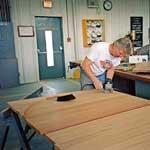- Posts: 15746
- Thank you received: 320
New report: just how much a car commute crushes your soul
- ScienceChic
-
 Topic Author
Topic Author
- Mountain Champion
-

New report quantifies just how much a car commute crushes your soul
by Jess Zimmerman 21 Jan 2011 5:53 AM
Car commutes sap your life force -- that's common knowledge. But can you quantify exactly how much, and how quickly? The Texas Transportation Institute at Texas A&M University can. It's just released its annual Urban Mobility Report, http://mobility.tamu.edu/ums/ which includes data on how much time, money, and mental health urban-area car commuters lose to congestion every year.
D.C. and Chicago are most congested: lose 70 hours of their lives to rush-hour traffic every year. That's not how much time they spend in a car -- that's how much longer they spend in a car than they would under better traffic conditions.
Congestion costs money: Between the value of their time and the excess fuel consumption from their extra hours on the road (57 extra gallons for pack leader D.C., 39 on average), car commuters are paying good money for the privilege of a frustrating drive. The average cost to all commuters was $808, and the average over 15 very large metro areas was $1,166.
Congestion costs more than money: First of all, the environmental effect of all of this congestion is downright gross. From the TTI press release: "The total amount of wasted fuel in 2009 topped 3.9 billion gallons -- equal to 130 days of flow in the Alaska Pipeline."
Public transportation helps, a lot: The researchers estimated that the extensive public transport system in runaway leader New York saved commuters almost $9 billion and over 350 million potential lost hours [PDF]. On the whole, public transportation made a huge difference in alleviating the money and time cost of congestion -- it saved commuters 785 million hours and 640 million gallons of fuel over the year, for a total of $19 billion. Improvements in road efficiency (i.e., road changes that aren't just more roads) helped only half as much.
The solution is less sprawl, not more roads: The keenest criticism of the report is that it unjustly penalizes densely-packed cities, which are better than sprawly ones in basically all other ways. So you should take the rankings with a grain of salt. But we'll co-sign on the general conclusions: Americans spend a metric buttload of time and energy just slogging our way through traffic, and public transportation can help reduce the burden.
How Denver fares: http://mobility.tamu.edu/ums/congestion ... /denve.pdf
"Now, more than ever, the illusions of division threaten our very existence. We all know the truth: more connects us than separates us. But in times of crisis the wise build bridges, while the foolish build barriers. We must find a way to look after one another as if we were one single tribe.” -King T'Challa, Black Panther
The truth is incontrovertible. Malice may attack it. ignorance may deride it, but in the end, there it is. ~Winston Churchill
Please Log in or Create an account to join the conversation.
- major bean
-

- Mountain Legend
-

- Posts: 2612
- Thank you received: 0
Regards,
Major Bean
Please Log in or Create an account to join the conversation.
- ScienceChic
-
 Topic Author
Topic Author
- Mountain Champion
-

- Posts: 15746
- Thank you received: 320
http://mobility.tamu.edu/ums/report/met ... atsnew.stm
How We Got the Numbers
Methodology – What's New for 2010
The new data and analysis changes the way the mobility information can be presented and how the problems are evaluated. The changes for the 2010 report are summarized below.
* Hour-by-hour speeds collected from a variety of sources on every day of the year on most major roads are used in the 101 detailed study areas and the 338 other urban areas. For more information about INRIX, go to [url=http://www.inrix.com" onclick="window.open(this.href);return false;]http://www.inrix.com[/url].
* An improved speed estimation process was built from the new data for major roads without detailed speed data. (See the methodology descriptions on the Report website – mobility.tamu.edu).
* The data for all 24 hours makes it possible to track congestion problems for the midday, overnight and weekend time periods.
http://mobility.tamu.edu/ums/resources/
http://www.fhwa.dot.gov/ohim/start.pdfThe documents and web sites below provide additional guidance and information for a variety of mobility measurement efforts.
Travel Time Data Collection Handbook
Methods to collect travel time and speed information.
http://mobility.tamu.edu/ucr/resources/ ... essing.pdf
Data Processing Steps in Mobility Monitoring Program
A short summary of the procedures used for data quality control and database creation.
http://tti.tamu.edu/documents/474360-1.pdf
Selecting Travel Reliability Measures
Performance measures for reliability from a user perspective.
"Now, more than ever, the illusions of division threaten our very existence. We all know the truth: more connects us than separates us. But in times of crisis the wise build bridges, while the foolish build barriers. We must find a way to look after one another as if we were one single tribe.” -King T'Challa, Black Panther
The truth is incontrovertible. Malice may attack it. ignorance may deride it, but in the end, there it is. ~Winston Churchill
Please Log in or Create an account to join the conversation.
- conifermtman
-

- Mountain Legend
-

Please Log in or Create an account to join the conversation.
- 2wlady
-

- Mountain Legend
-

- Posts: 1100
- Thank you received: 0
If I commuted to DC, it took 1.5 hours (bus and Metro).
I drove to VA jobs because I could make it in 45 minutes (11 miles) and bus took 1.5 hours, and had to change buses.
I also found that when it snowed, my bus would either be full and I would have to hike several stops back (DC) to find a bus that could take me, or, in the VA commute, the bus never came at all.
Here, I have no idea how I would get to my job if I commuted by bus. I gave up trying to figure it out after 3 bus changes.
Please Log in or Create an account to join the conversation.
- major bean
-

- Mountain Legend
-

- Posts: 2612
- Thank you received: 0
Independence, freedom, rugged individualism. That's what life is all about! Hunt the buffalo and take the risks with which it is associated.
Regards,
Major Bean
Please Log in or Create an account to join the conversation.
- CinnamonGirl
-

- Visitor
-

Please Log in or Create an account to join the conversation.
- 2wlady
-

- Mountain Legend
-

- Posts: 1100
- Thank you received: 0
Please Log in or Create an account to join the conversation.
- FredHayek
-

- Mountain Legend
-

- Posts: 30746
- Thank you received: 179
I know one woman who lives in LA where it takes her 30 minutes just to get onto the freeway!
Thomas Sowell: There are no solutions, just trade-offs.
Please Log in or Create an account to join the conversation.
- Rockdoc
-

- Mountain Legend
-

If lucky enough to work from home, it's great, but you do miss out on the social interactions that take place at work. What we need is a different form of transport from car, train, boat, etc. Beam me over Scotty would certainly take the bite out of our current methods. Certainly research og this type must be taking place.
Please Log in or Create an account to join the conversation.






